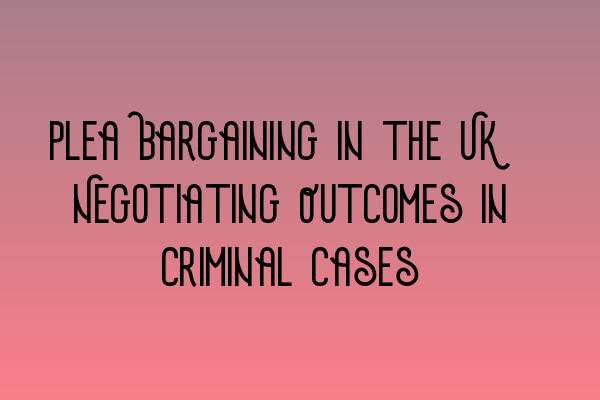Plea Bargaining in the UK: Negotiating Outcomes in Criminal Cases
When facing criminal charges, defendants in the UK have the option to consider plea bargaining as a strategy for negotiating their case’s outcome. Plea bargaining allows defendants to plead guilty to one or more charges in exchange for certain benefits, such as reduced charges, lesser sentences, or even the dismissal of some charges.
Understanding Plea Bargaining
Plea bargaining is a process where the defendant, their solicitor, and the prosecutor negotiate a mutually acceptable resolution to the case. It aims to save time and resources by avoiding a lengthy trial and provide incentives for defendants to cooperate and take responsibility for their actions.
Types of Plea Bargaining
There are three common types of plea bargaining in the UK:
- Charge Bargaining: In charge bargaining, the defendant agrees to plead guilty to a less severe charge than the one initially brought against them. This strategy can be beneficial for both the defendant and the prosecution in cases where the evidence may not be strong enough to secure a conviction on the original charge.
- Sentence Bargaining: Sentence bargaining involves the defendant accepting a guilty plea in exchange for a reduced sentence. This can be advantageous when the potential sentence for the original charge is severe, and the defendant wants to minimize the consequences.
- Fact Bargaining: Fact bargaining occurs when the defendant agrees to admit certain facts or elements of the crime in exchange for the dismissal of other charges or a reduced sentence. This approach allows the defendant to narrow the scope of the case and potentially avoid more severe charges.
Benefits and Considerations
Plea bargaining can offer several benefits to defendants, including:
- Reduced charges or sentence
- Opportunity for rehabilitation
- Avoidance of the uncertainties associated with a trial
However, defendants must carefully consider the implications of plea bargaining, as it may involve admitting guilt and facing the consequences of a criminal conviction. It is crucial to consult with a skilled solicitor who can assess the strength of the case, advise on the best negotiation strategy, and protect the defendant’s rights throughout the process.
Working with an Experienced Solicitor
To navigate the complexities of plea bargaining effectively, it is essential to work with an experienced solicitor who specializes in criminal law. A knowledgeable solicitor can analyze the evidence, identify potential weaknesses in the prosecution’s case, and negotiate for the best possible outcome.
At SQE Criminal Law & Practice Law UK, our team of solicitors has extensive experience in plea bargaining and criminal defense. We understand the nuances of the law and can provide strategic guidance tailored to each client’s circumstances.
As part of our comprehensive services, we also offer:
- SQE 1 Practice Exam Questions to help you prepare for the SQE 1 exam
- SQE 1 Practice Mocks FLK1 FLK2 for invaluable practice and familiarization with the examination format
- SQE 2 Preparation Courses to support your studies for the SQE 2 exam
- SQE 1 Preparation Courses to improve your overall knowledge and skills
- SRA SQE Exam Dates to stay updated with the upcoming examination schedules
Conclusion
Plea bargaining can be a valuable tool for defendants in the UK criminal justice system. It provides an opportunity to negotiate more favorable outcomes and minimize the potential consequences of criminal charges. However, it is essential to rely on the expertise of a skilled solicitor who can guide you through the process, protect your rights, and secure the best possible resolution.
